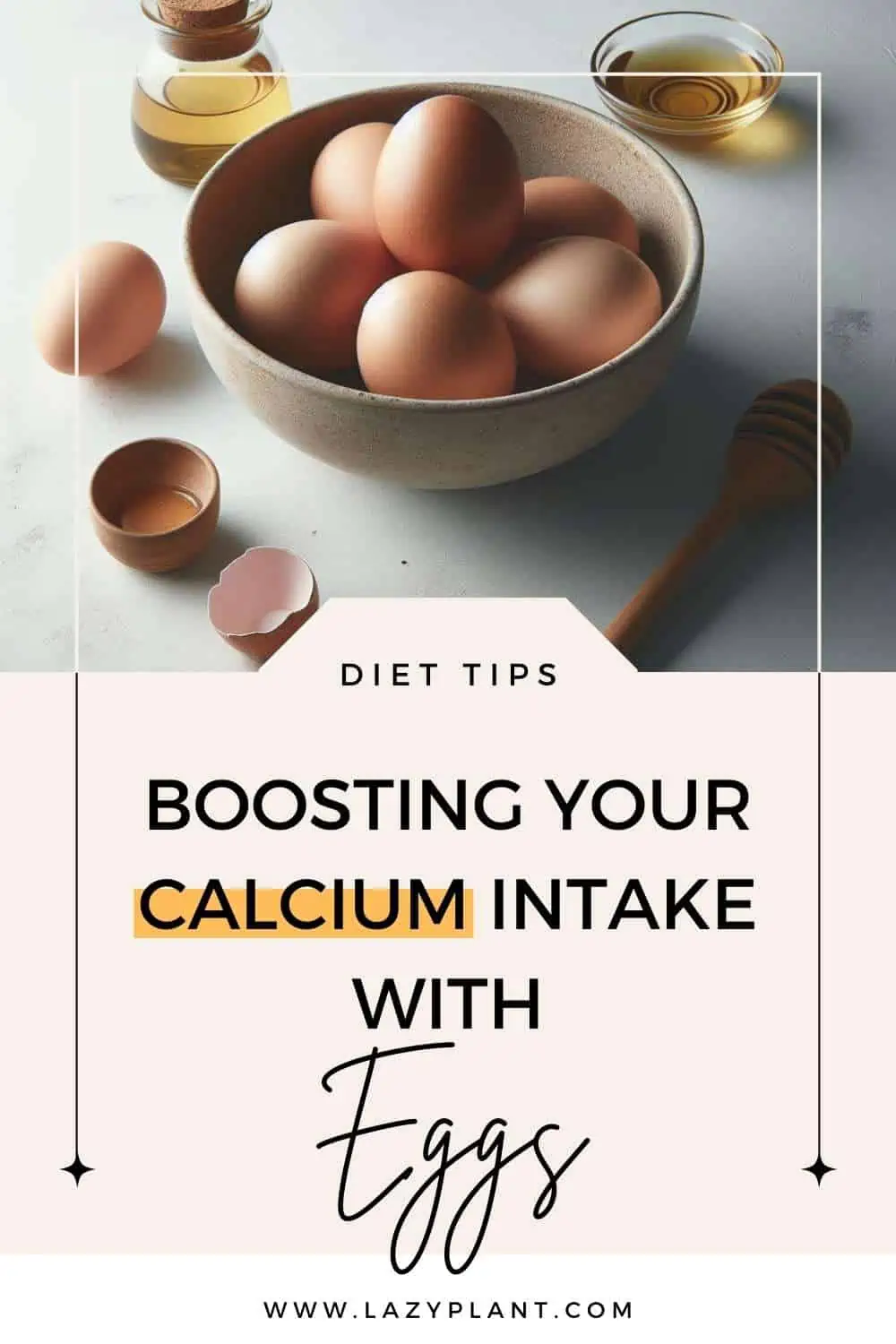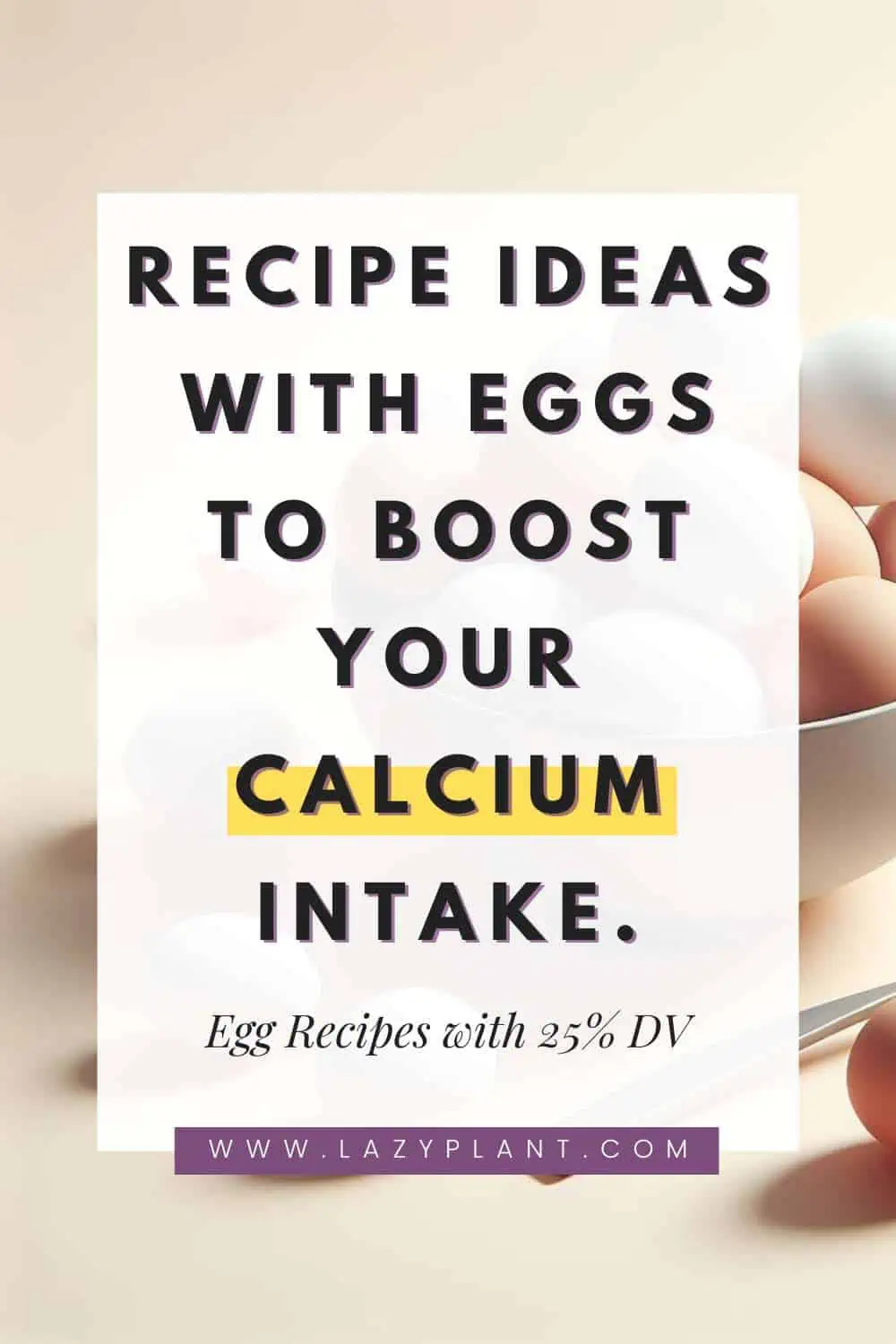Eggs contain moderate amounts of calcium. An egg contains 24 mg of calcium or 2.4% of the recommended daily intake! Even so, they indirectly contribute to the daily calcium intake.
Health benefits of calcium
Calcium is the most abundant mineral in the body! It’s well-known for its importance in bone structure and strong teeth. Inadequate amounts of calcium may lead to osteoporosis.
Moreover, calcium is involved in many functions of the human body. It’s necessary for muscle movement and flexibility, blood vessel contraction and dilation, blood clotting, nerve transmission, and hormonal secretion.
Getting adequate amounts of calcium may lower the risk of developing cardiovascular disease, hypertension, stroke, atherosclerosis, and even certain cancers.[1,2]
How much calcium do we need a day?
The recommended daily intake of calcium is 1,000 mg for adults. Children older than 13 years and teenagers require at least 1,300 mg of calcium, due to bone growth. Women older than 50 years should get at least 1,200 mg of calcium, due to the increased risk of osteoporosis.

Are eggs a good dietary source of Calcium?
Eggs contribute to your dietary calcium intake, but they are not considered a good or primary source. An egg contains 24 mg of calcium which is only 2.4% of the recommended daily intake.[3]
To put this in perspective:
- a cup of 2% milk provides around 350 mg of calcium, and a cup of whole milk yogurt contains approximately 300 mg.
- you would need to eat more than 40 eggs to meet your calcium needs, which is impractical and unrealistic.
A 3-egg omelet provides about 72 mg of calcium or 7.2% of the Daily Value.
A cup of milk has 7 times more calcium than a serving of 2 eggs!
The yolk or white are richer in Calcium?
While both the yolk and white of an egg contain some calcium, the yolk is significantly richer in this mineral. The yolk boasts approximately 9 times more calcium compared to the white. Here’s a breakdown:
- Egg yolk contains around 22 mg of calcium per large egg.
- Egg white contains only 2.3 mg of calcium per large egg.
Consuming many egg whites won’t help you meet your daily needs.
Egg yolk contains over 90% of the calcium in an egg.
Do free-range Eggs have more Calcium than conventional ones?
There is no significant difference in the calcium content of free-range eggs compared to conventional eggs.
The calcium content of an egg primarily depends on the genetics and diet of the hen, not its living conditions. Both free-range and conventional hens require a certain amount of calcium in their diet to produce eggshells.
While free-range hens might have access to natural sources of calcium in their environment like insects or greens, this doesn’t necessarily translate to a higher calcium content in their eggs compared to hens fed a controlled diet containing necessary nutrients.
The living conditions of a hen can play a significant role in the vitamin D content of eggs, though, as hens living under the sun produce this important fat-soluble vitamin. Did you know that eggs are the richest common dietary source of vitamin D?
Do darker eggs contain more Calcium?
No, the color of the shell does not significantly impact its calcium content. The shell color is primarily determined by the breed of the hen, not the amount of calcium in the egg.
The calcium used to form the shell comes from the hen’s diet, not the pigment responsible for the shell color.
The brown color in some shells comes from a pigment called protoporphyrin, a byproduct of hemoglobin breakdown. This pigment has no bearing on the calcium content.[4]
While there might be slight variations in calcium content between individual eggs, regardless of color, these differences are negligible.
Both brown and white eggs contain similar amounts of calcium.
Do Vegan Egg replacers have any Calcium?
The calcium content of vegan egg replacers varies depending on the specific product and ingredients used. Some may contain decent amounts of calcium, while others might have very little.
Commercially produced: These often contain a blend of plant-based ingredients like chickpea flour, tapioca starch, and leavening agents. Some brands might fortify their products with calcium, while others don’t. On Amazon, you’ll find vegan egg replacers that provide up to 10% of the Daily Value per serving. It’s crucial to check the specific product label to understand its calcium content.
Homemade: Using ingredients like ground flaxseeds, chia seeds, or applesauce typically results in minimal calcium content unless additional sources are incorporated. Some recipes might suggest adding ingredients like chia seeds or almond milk, which can contribute some calcium.
Vegan egg replacers may have more calcium than eggs!
Do we absorb the Calcium in Eggs?
The absorption of calcium in eggs by the body might be lower compared to other dietary sources, like dairy products, which have the highest absorption rate among common foods (close to 27%).[5]
Egg yolk protein and especially phosvitin inhibit the absorption of calcium as well as magnesium in eggs.[6]
Can I eat eggshells for Calcium?
Yes, you can eat eggshells to boost calcium intake, but it isn’t recommended. Eggshells are hard and sharp, and consuming them can irritate your throat, esophagus, and digestive tract, leading to discomfort and potential injury.
While eggshells are 40% calcium, their absorption by the body is limited.
Half an eggshell can provide more calcium than the recommended daily intake! You could use fine-powdered eggshells in your recipes or as a cheap homemade calcium supplement.[7]
It may be more beneficial for protecting bone mass than calcium supplements![8]
Keep in mind that raw eggshells might harbor bacteria like Salmonella, posing a risk of foodborne illness if not properly cleaned and sanitized.
Eggshells can be a cheap and more beneficial homemade alternative to calcium supplements!
Do cooking methods affect Calcium concentrations?
Cooking methods can have a slight impact on the calcium content of eggs, but the effect is generally minimal and unlikely to significantly affect your overall calcium intake.
Boiling, poaching, and steaming are generally considered gentle methods that are unlikely to cause significant calcium loss. They don’t destroy nutrients in the yolk, where most calcium is also stored.
Frying and scrambling involve higher temperatures and may lead to slightly lower calcium retention compared to gentler methods, but the difference is usually negligible.
Focusing on consuming a variety of calcium-rich foods remains the most crucial factor for ensuring adequate calcium intake.
Can I depend on Eggs for Calcium?
You should consume eggs in moderation. They’re pretty rich in cholesterol and saturated fatty acids. Just an egg contains 1.6 grams of saturated fatty acids, which is 12% of the maximum safe intake! High intakes of saturated fats may raise cholesterol and increase the risk of heart disease and stroke.[9]
Most healthy adults can safely consume up to 7 eggs per week without impacting their heart health. Hence, you cannot depend on eggs as a primary source of calcium.
Consider your total intake of saturated fat and cholesterol from other sources in your diet.
If you have high cholesterol, your doctor might recommend limiting egg intake.
May improve Calcium absorption
Keep in mind that eggs have a superior nutritional value. They’re low in calories, while they’re rich in vitamins and minerals. Just an egg has more than 6 grams of high-quality protein, while it’s pretty rich in iron, zinc, choline, vitamin A, vitamin B12, vitamin D, and omega-3 fatty acids.
Eggs may have a low calcium content but they do offer some vitamins and minerals that might indirectly support calcium absorption when consumed as part of a balanced diet:
- Vitamin D: Found abundant in the yolk, vitamin D plays a crucial role in calcium absorption.
- Vitamin K: Found in small amounts in both the yolk and white, vitamin K plays a role in bone health and may indirectly support calcium absorption.
- Protein: Adequate protein intake can support bone health and potentially improve calcium absorption.
Vitamin B12 does not directly impact calcium absorption in healthy individuals. However, vitamin B12 deficiency can indirectly affect calcium metabolism and bone health in some cases.
Vitamin B12 deficiency can impair bone formation and lead to increased bone breakdown, potentially impacting overall calcium levels. Also, it can elevate homocysteine, an amino acid linked to increased bone fracture risk.
Certain foods inhibit Calcium absorption!
Several foods and compounds can hinder calcium absorption in the body.
Oxalic acid binds to calcium in the gut, forming insoluble complexes that cannot be absorbed by the body. Found in foods like spinach, rhubarb, beet greens, and certain beans. Cooking methods like boiling can slightly reduce the oxalate content in some vegetables.
Phytate also hinders its absorption. These compounds are present in whole grains, legumes, nuts, and seeds. Soaking, sprouting, and fermenting these foods can help reduce phytate content.

While fiber is essential for overall health, excessive intake can interfere with calcium absorption.
Moderate intake of caffeine (around 400 mg per day) is unlikely to significantly impact calcium absorption in healthy individuals. However, excessive caffeine intake can potentially interfere with calcium absorption, especially in individuals with marginal calcium intake.
Excessive alcohol consumption can impair calcium absorption by disrupting gut health, affecting vitamin D metabolism, which is crucial for calcium absorption, and increasing urinary calcium excretion.
Excessive sodium intake has been linked to increased urinary calcium excretion as well.
By being mindful of these factors and maintaining a balanced diet, you can ensure adequate calcium absorption and support your overall bone health.
When should I eat Eggs to boost Calcium Intake?
The time of day you eat eggs does not significantly impact their calcium content or absorption. Focus on incorporating a variety of calcium-rich foods throughout your day to ensure you meet your daily needs.
What will happen to my Bones & Teeth if I eat eggs every day?
Protein, calcium, and vitamin D have beneficial effects on bone mineralization. Eggs as part of a healthy, balanced diet could protect your bone muscle and teeth.
Recipe Ideas to boost your Calcium intake
Getting adequate amounts of calcium from your diet is easy. There are many recipes that combine eggs with animal and plant-based sources of calcium that you can enjoy daily.
Foods rich in Calcium
For adequate calcium intake, focus on including dairy products, leafy greens, fortified foods, and seafood in your diet. These options offer significantly higher calcium content and better absorption compared to eggs.
- Dairy products: Milk, cheese, and yogurt are excellent sources of readily absorbable calcium.
- Leafy greens: Kale, collard greens, and spinach provide calcium and other vital nutrients.
- Fortified foods: Plant-based milks, tofu, and cereals often have added calcium.
- Seafood: Canned sardines and salmon with bones offer calcium and other minerals.
Beans, certain fruits, leafy vegetables, nuts, and seeds are also excellent plant-based sources of calcium. For instance, kale contains more than 250 mg while spinach contains about 100 mg of calcium per 100g!
The richest common vegan food in calcium per serving is tahini.
If you want to boost your daily calcium intake, you could consume moringa powder, though. I add it to smoothies and soups. Moringa powder is among the richest foods in calcium, containing about 2,700 mg of calcium per 100g! Just for comparison, cow’s milk contains only 113 mg of calcium per 100 mL. 2 teaspoons of moringa powder contain 70 mg of calcium! Moringa is a true superfood! You’ll find a wide variety of moringa supplements and powders on iHerb.
Consuming high amounts of calcium from food is safe. But, we shouldn’t get extremely high amounts from supplements.
Calcium-rich Recipe Ideas with Eggs
By combining eggs with various calcium-rich ingredients, you can create satisfying and nutritious meals that contribute to your overall well-being.
Breakfast:
- Scrambled Eggs with Spinach and Feta Cheese: This classic combination provides protein from eggs and calcium from spinach and feta.
- Egg Muffins with Broccoli and Cheddar Cheese: Pre-portion these egg muffins for a quick and nutritious breakfast on the go. Broccoli and cheddar cheese add calcium and fiber.
- Omelet with Mushrooms and cottage Cheese: This savory omelette offers protein, calcium, and vitamins from the mushrooms and cottage cheese.

Lunch:
- Egg Salad Sandwich on Whole-Wheat Bread: Combine mashed hard-boiled eggs with Greek yogurt or mayonnaise for a creamy spread. Add chopped vegetables for extra nutrients.
- Cobb Salad with Grilled Chicken and Avocado: This salad features protein from chicken and eggs, calcium from cheese, and healthy fats from avocado.
- Quinoa Bowl with Roasted Vegetables and a Poached Egg: Quinoa is a complete protein source and supports weight loss, while roasted vegetables like broccoli and kale add calcium and fiber. The poached egg provides additional protein and nutritional value.
Snacks:
- Hard-Boiled Eggs with Sliced Bell Peppers and Hummus: Hard-boiled eggs are a convenient snack, and pairing them with bell peppers and hummus provides additional vitamins, fiber, and calcium from the hummus.
- Egg Salad Lettuce Wraps: A lighter alternative to bread-based sandwiches, lettuce wraps filled with egg salad offer protein, calcium, and fiber.
My favorite recipe:
- Tahini-Roasted Cauliflower Bowls with Fried Eggs and Kale:
- Toss cauliflower florets with olive oil, cumin, paprika, salt, and pepper.
- Roast in the oven for 20-25 minutes, or until tender and golden brown.
- While the cauliflower roasts, heat olive oil in a pan over medium heat.
- Fry eggs to your desired doneness.
- In a small bowl, whisk together tahini, lemon juice, and parsley.
- Serve roasted cauliflower, fried eggs, and tahini sauce on individual bowls, topped with crumbled feta cheese.
- One serving would contain around 254 mg of calcium, which is approximately 25% of the Daily Value (DV) for adults.
These are just a few ideas to get you started. Explore different combinations and ingredients to create healthy and delicious meals that suit your preferences and dietary needs.
Calcium-packed Snack Ideas for the Kids:
- Mini Frittatas:
- Whisk together eggs, shredded cheese, chopped vegetables (like spinach, bell peppers, or mushrooms), and pour into muffin tins.
- Bake at 375°F (190°C) for 15-20 minutes until set.
- These are portable and perfect for on-the-go mornings.
- Egg Salad on Whole-Wheat Crackers:
- Mash hard-boiled eggs with a little mayonnaise, mustard, and chopped vegetables.
- Spread on whole-wheat crackers for a protein and calcium punch.
12+1 Myths about Calcium in Foods
Myth 1: Milk is the only good source of calcium.
Busted: While dairy products are a good source of calcium, there are many other options available. Leafy greens like kale and collard greens, fortified plant-based milk, tofu, canned sardines with bones, and certain seafood like salmon are all excellent sources of calcium. Even eggs contribute to meeting your daily intake.
Myth 2: You need to drink a lot of milk to get enough calcium.
Busted: While milk can be part of a balanced diet, it’s not necessary to consume large amounts to meet your calcium needs. Focusing on a variety of calcium-rich foods throughout the day is more effective. Have you considered drinking kefir? It’s the healthiest dairy product, as it’s the richest food in probiotics!
Myth 3: Drinking coffee hinders calcium absorption.
Busted: Moderate coffee consumption (around 400 mg per day) is unlikely to significantly impact calcium absorption in healthy individuals. However, excessive caffeine intake can potentially interfere with calcium absorption.
Myth 4: Calcium supplements are always necessary.
Busted: Most healthy individuals can meet their calcium needs through a balanced diet rich in calcium-rich foods. Supplements may be recommended for individuals with specific needs or deficiencies, but it’s essential to consult a healthcare professional before taking any supplements.
Myth 5: Children need more calcium than adults.
Busted: While calcium is crucial for bone development in children, their daily needs are not significantly higher than adults. They can meet their calcium requirements through a balanced diet.

Myth 6: Eating cheese is bad for bone health.
Busted: Cheese can be part of a healthy diet and contribute to calcium intake. However, it’s essential to choose varieties in moderation due to their high saturated fat and sodium content. Cottage cheese is one of the healthiest types of cheese you can enjoy without guilt.
Myth 7: Cooking destroys calcium in food.
Busted: Most common cooking methods have minimal impact on calcium content in food. However, overcooking vegetables can lead to some nutrient loss.
Myth 8: Mixing calcium with certain foods like spinach hinders absorption.
Busted: While spinach contains oxalic acid, which can bind to calcium and reduce its absorption, the effect is relatively minor. Consuming enough calcium from various sources throughout the day can overcome this potential barrier.
Myth 9: You can’t absorb calcium without vitamin D.
Busted: Vitamin D plays a crucial role in calcium absorption, but the body can still absorb some calcium even without it. However, maintaining adequate vitamin D levels through sunlight exposure, diet, or supplements is crucial for optimal calcium absorption and bone health.
Myth 10: Taking calcium supplements with meals is always beneficial.
Busted: Taking calcium supplements with food can improve absorption in some cases. However, it can also interfere with the absorption of other minerals like iron and zinc. Consult a healthcare professional for personalized advice on timing calcium supplements.
Myth 11: High protein intake hinders calcium absorption.
Busted: Research on the impact of high protein intake on calcium absorption is inconclusive. While very high protein diets might potentially affect absorption in some individuals, it’s not a significant concern for most people.
Myth 12: Drinking soda weakens bones due to its calcium-leaching effect.
Busted: While some studies suggest a potential link between excessive soda consumption and lower bone mineral density, the evidence is not conclusive. The primary concern with soda is its high sugar content, which can contribute to various health problems.
Myth 13: You can’t get enough calcium from a plant-based diet.
Busted: A well-planned plant-based diet can provide adequate calcium through various sources like leafy greens, fortified foods, and certain nuts and seeds. Soy milk, tofu, and other soy products are excellent vegan sources of calcium.